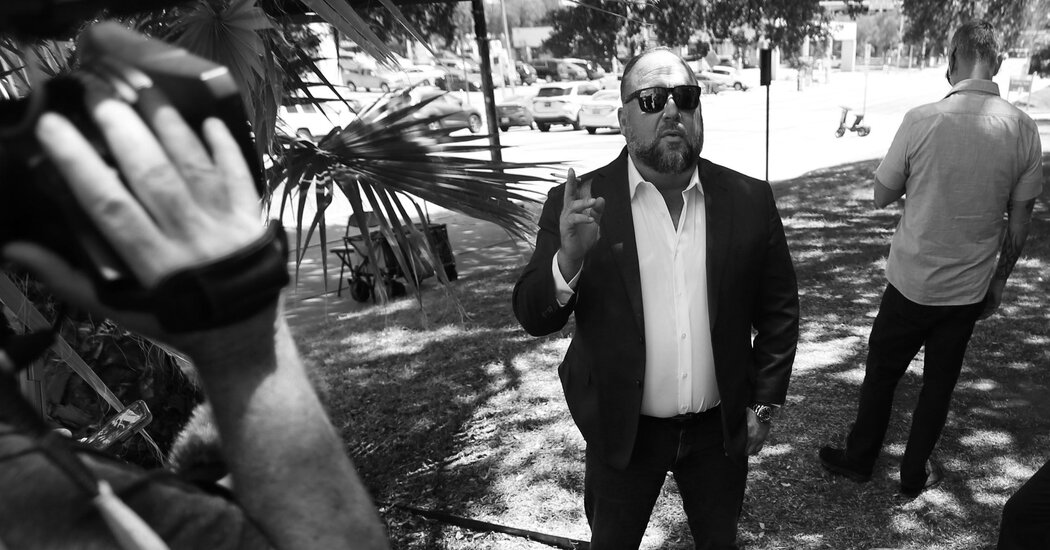Opinion | Alex Jones and the Wellness-Conspiracy Industrial Complex

When Owen Shroyer, an anchor and reporter for Infowars, took the stand late last month in the defamation trial of his boss, the far-right conspiracy theorist Alex Jones, he was asked about the many health products for sale on Jones’s site. Among them: diet pills, fluoride-free toothpaste that Jones once claimed “kills the whole SARS-corona family at point-blank range” and InstaHard, a supplement whose purpose I probably don’t have to spell out.
“Do you know if any of it’s been tested to see if it’s effective or any good at all?” asked an attorney for Neil Heslin and Scarlett Lewis, whose son Jesse was killed in the 2012 massacre at Sandy Hook Elementary School.
“Well, we test the products for ourselves,” Shroyer said.
“You mean you take them?”
“Yes.”
“And you’re still here, so it must be OK?”
“Yeah. It works for me.”
The Jones trial was a spectacle, full of bizarre asides from Jones and embarrassing mistakes by his lawyers, and I was not surprised when Jones lost big. He has claimed for years that the Sandy Hook shooting was a hoax — a false-flag operation staged by the left to bolster the case for gun control. His lies compounded the grief of the parents who lost children at Sandy Hook; last week, in the culmination of this first of several defamation cases brought by parents, a jury in Texas awarded Heslin and Lewis nearly $50 million in damages.
But it was what the trial revealed about Jones’s finances and how Infowars operates as a business that I found most intriguing. In particular, we saw just how staggeringly lucrative Jones’s schtick can be and, despite the parents’ victory, how difficult it might be to shut down the money that flows to conspiracists like Jones.
The problem lies in the symbiotic relationship between bogus, unregulated health products and bogus political claims. Call it the wellness-conspiracy industrial complex. Jones produces an incessant barrage of outrageous, thinly sourced or wholly mendacious content in the hopes that some of it will go viral. When people click on the stories and land on his site, they are bombarded with ads for snake oil. He claims to be offering people truths that they won’t get in mainstream media, but that’s backward. The conspiracy theories are better seen as a marketing tool for his real products — InstaHard, BodEase, Diet Force and all manner of oils, tinctures and supplements.
Jones was one of the pioneers in connecting out-there cures to out-there political claims, but he is by no means alone. Over the past decade — and especially during the pandemic — the internet has been overrun with influencers who peddle what some researchers have called conspirituality, a worldview that meshes New Age-y ideas in alternative health with a Trump-era penchant for alternative facts. The Los Angeles Times reported last year that lefty-seeming wellness circles in California had become fertile ground for the QAnon conspiracy theory. The crossover has been especially obvious in the anti-vaccine movement. Today, vaccine skeptics are more at home on the MAGA-loving political right, but some of the movement’s earlier proponents, like Robert F. Kennedy Jr., were more closely aligned with the left. As Rolling Stone put it, “the anti-vaxxers got red-pilled.”
The coziness between wellness ideas and conspiracy theories sounds odd, but when you dig into these movements, you find considerable overlap. Matthew Remski, a journalist who has covered the nexus, has argued that wellness philosophies are rooted in the beliefs that “nothing is as it seems,” “everything happens for a reason” and “everything is connected.” That set of beliefs, he wrote, “rolled out a cognitive and psychological welcome mat for conspiracist fascinations, up to and including QAnon.”
Stephanie Alice Baker, a sociologist at the City University of London who has studied wellness influencers, said that there is a quest for “purity” and “raising awareness and consciousness” at the heart of wellness culture that makes it particularly vulnerable to conspiracy thinking. She told me that she noticed that practices that were prevalent in wellness — things like doing a cleanse, taking supplements to rid one’s body of vague “toxins” and experiencing “ascension” or “awakening” — shared an underlying moral framework with political slogans like “Drain the swamp” and “Make America Great Again.” People who refused to get Covid vaccines often point to a feeling of being clean; some even called themselves purebloods.
Then there is a shared distrust of elites. Many of Jones’s conspiracy theories ask readers to be skeptical of mainstream media and government authorities. His health products make similar claims; many are touted for their origins in Eastern medicine or because they are upsetting to the Food and Drug Administration, Big Pharma and multinational biotech companies.
In both politics and health, these influencers see themselves as “providing a refuge from the mainstream, which they see as being compromised and corrupt and associated with compliance,” Baker said.
But beyond the philosophy is the money: Selling unregulated health products is very big business. Bernard Pettingill Jr., a forensic economist hired by the plaintiffs in the Jones trial, testified that Free Speech Systems — the legal entity under which Jones operates Infowars — made an average of $55 million in annual revenue from sales in the Infowars store from 2016 to 2019.
In 2018, Facebook, YouTube, Apple and other tech companies kicked Jones off their services, but if deplatforming reduced Jones’s reach, it didn’t really hit his business. Lawyers for the plaintiffs presented text messages from his employees — part of a cache of messages that his attorneys mistakenly sent to the plaintiffs — that showed the company sometimes making $700,000 or $800,000 per day after deplatforming. Free Speech made $65 million in revenue in 2021, Pettingill testified.
The numbers also suggested that a lot of the money was profit. A text message from Infowars’ operations manager revealed that of $110,000 in sales of packaged survivalist food — you know, to eat when the new world order takes over or something — almost $70,000 was “pure profit.” Jones testified that margins varied by product. “Some products make 20 percent. Some products make 60 percent,” he said.
The plaintiffs’ attorney argued that the only way to stop Jones’s spree of lies was to hit him with a judgment high enough to put him out of business forever. But I’m not sure that’s possible. For one thing, there is a question about how much Jones will actually be made to pay — Texas’ strong antitort laws might significantly cut down the jury’s damage award. But even if Jones is stuck with a multimillion-dollar punishment, he can always set up shop again.
A more permanent solution to Jonesian lies would be to go after the huge market for alternative health products. Current law prevents the Food and Drug Administration from regulating a wide range of supplements, and even where they do have authority, regulators have been lax in enforcing the rules. Jones is a one-man argument for drastic change. By better policing the market for alternative health, regulators can cut down on two scourges at once.
Office Hours With Farhad Manjoo
Farhad wants to chat with readers on the phone. If you’re interested in talking to a New York Times columnist about anything that’s on your mind, please fill out this form. Farhad will select a few readers to call.
The Times is committed to publishing a diversity of letters to the editor. We’d like to hear what you think about this or any of our articles. Here are some tips. And here’s our email: letters@nytimes.com.
Follow The New York Times Opinion section on Facebook, Twitter (@NYTopinion) and Instagram.
This article has been archived for your research. The original version from The New York Times can be found here.


